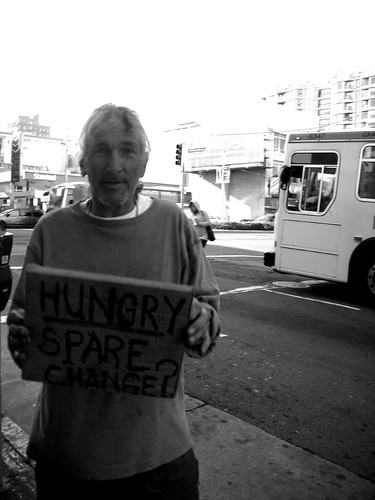Matthew 20:1-16
This text provides not only an argument for a minimum wage, one that is based on how much someone actually needs to live rather than hourly amount that people should earn, but it also provides a biblical argument for a maximum wage.Remember while in today's day this tends to fall down political lines, this text seems to make it clear that Jesus does not believe in a "trickle down economy." Beyond this it seems that God(dess) is also concerned that everyone have to opportunity to obtain their daily wage.
God(dess)'s employment strategy is beyond any non-discrimination policy. Notice that there is no mention of the age, sex, sexual orientation, gender identity or presentation, skill level, mental health status or immigration status. Only a clear understanding that all people require a fair wage - despite their ability to work at equal levels.
 People often say the homeless, mentally ill or disabled are not "entitled" to the same daily wage as others. I invite anyone who thinks that you do not have to work to be homeless, or to obtain social security benefits to sit in a social security office for an hour and observe people. Or check out my blog of my experiences from my yearly street retreat.
People often say the homeless, mentally ill or disabled are not "entitled" to the same daily wage as others. I invite anyone who thinks that you do not have to work to be homeless, or to obtain social security benefits to sit in a social security office for an hour and observe people. Or check out my blog of my experiences from my yearly street retreat.Try collecting enough cans from garbage cans to pay for one meal or panhandle $20. Then you will know just a portion of the work that the homeless do on a regular basis. Then imagine accomplishing any of this without a good nights sleep and a sore aching body from lying on a hard concrete bed.
Often the people who are making the smallest amounts of money in the United States are the same individuals who face discrimination each day. How is it fair that those who are doing the most labor intensive jobs, at the lowest hourly rates are also the ones who are experiencing the additional strain of discrimination? Think of what a fair rate of pay would be for the back breaking work of picking strawberries everyday or for unloading a moving van. How much extra should we also pay for the social stigma and discrimination we also make these same workers endure?
Perhaps if people had to pay those they discriminated against they would stop discriminating. But, often those who are trying to rise above poverty or opression often oppress others. This is a lot like the complaining of those who had worked the longest. Is there any wordly way out of this cycle of abuse?
It seems that nothing short of total economic reform in addition to providing daily protection for all is needed. While this may seem overwhelming, we can work one organization, one employer at a time or one city or state at a time.
We need to become people who are honest about our power, honest about our part in economically keeping others down and the ways that we stand in the way of others having their fair wage. Then we need to hire others as we are able, advocate for better daily wages for all and for equal employment opportunities.
Lectionary Cycle B: Proper 20A/Ordinary 25A/Pentecost +19
No comments:
Post a Comment